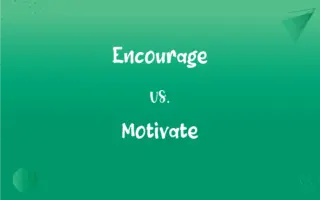Practice vs. Experience: What's the Difference?
Edited by Janet White || By Aimie Carlson || Published on January 31, 2024
Practice is the repeated exercise of an activity or skill to improve proficiency. Experience refers to the knowledge or skill acquired through involvement in or exposure to events.

Key Differences
Practice involves active engagement in a task or activity to develop or improve a skill. Whereas, experience is gained passively through living through events or circumstances.
The purpose of practice is to learn, improve, or maintain skills through repetition. While, experience provides insights and understanding from real-life events, not necessarily repetitive.
Practice is a deliberate, time-bound activity focused on skill enhancement. Experience accumulates over time, often without conscious effort.
Practice is often used in the context of learning, training, or professional development. However, experience is broader, encompassing personal, professional, and life events.
Practice can be measured in terms of hours or proficiency levels achieved. Experience is less tangible, often gauged through the depth and breadth of exposure to events.
ADVERTISEMENT
Comparison Chart
Nature
Active engagement
Passive accumulation
Purpose
Skill improvement
Insight and understanding
Measurement
Time spent, proficiency levels
Depth and breadth of exposure
Context
Learning, training, professional development
Personal, professional, life events
Outcome
Improved skills, proficiency
Knowledge, wisdom, perspective
ADVERTISEMENT
Practice and Experience Definitions
Practice
Customary Way of Doing Something.
It's our practice to greet each customer.
Experience
Direct Participation in Events.
Her experience in marketing was invaluable.
Practice
Exercise of a Profession.
She began her practice as a lawyer.
Experience
Practical Contact with Facts or Events.
Traveling offers a wealth of cultural experience.
Practice
Repetition of an Activity.
Daily practice of the piano improved her skills.
Experience
Event or Occurrence Leaving an Impression.
The concert was an exhilarating experience.
Practice
Application of Rules or Ideas.
The practice of democracy is vital for freedom.
Experience
Knowledge Gained from Past Activities.
His experience as a teacher enriched his parenting.
Practice
Performance of an Exercise.
Yoga practice helps in relaxation.
Experience
Subjective Reaction to an Event.
She found the experience of skydiving thrilling.
Practice
To do or perform habitually or customarily; make a habit of
Practices courtesy in social situations.
Experience
The apprehension of an object, thought, or emotion through the senses or mind
A child's first experience of snow.
Practice
To do or perform (something) repeatedly in order to acquire or polish a skill
Practice a dance step.
Experience
Active participation in events or activities, leading to the accumulation of knowledge or skill
A lesson taught by experience.
A carpenter with experience in roof repair.
FAQs
What does 'practice' mean?
Practice is the repeated exercise of an activity to improve skills.
How does 'practice' relate to learning?
Practice is essential for learning and mastering new skills.
What's an example of 'practice' in daily life?
Practicing a musical instrument daily is a common example.
What does 'experience' mean?
Experience refers to the knowledge gained from living through events.
Can 'practice' be applied to professions?
Yes, it refers to the ongoing application of professional skills.
Is 'practice' always deliberate?
Typically, yes, as it involves intentional repetition.
How is 'experience' different from education?
Experience is practical and often informal, unlike formal education.
Is 'experience' always positive?
Not necessarily, it can include challenging or negative events.
How do you use 'experience' in a sentence?
"Her experience in crisis management was crucial during the emergency."
What's the role of 'practice' in professional development?
It's vital for skill enhancement and maintaining proficiency.
How does 'experience' influence decision-making?
Experience provides insights and perspectives that inform choices.
What's an example of 'experience'?
Working in a particular field for years gives you experience in it.
How do you use 'practice' in a sentence?
"Regular practice is key to mastering a language."
Can 'experience' be fast-tracked?
No, it accumulates naturally over time.
What are the synonyms of 'practice'?
Training, rehearsal, and exercise are synonyms of practice.
Are 'practice' and 'experience' related?
Yes, they often go hand in hand; practice can lead to experience, and experience can guide practice.
Can 'practice' replace 'experience'?
No, practice and experience complement each other but are not interchangeable.
Is 'practice' more important than 'experience'?
Both are important; practice develops skills, experience gives context.
What are the synonyms of 'experience'?
Exposure, involvement, and participation are synonyms of experience.
Can 'experience' be purely theoretical?
No, experience implies practical, real-world involvement.
About Author
Written by
Aimie CarlsonAimie Carlson, holding a master's degree in English literature, is a fervent English language enthusiast. She lends her writing talents to Difference Wiki, a prominent website that specializes in comparisons, offering readers insightful analyses that both captivate and inform.
Edited by
Janet WhiteJanet White has been an esteemed writer and blogger for Difference Wiki. Holding a Master's degree in Science and Medical Journalism from the prestigious Boston University, she has consistently demonstrated her expertise and passion for her field. When she's not immersed in her work, Janet relishes her time exercising, delving into a good book, and cherishing moments with friends and family.






































































